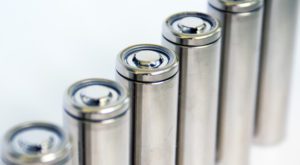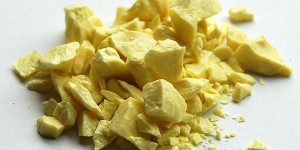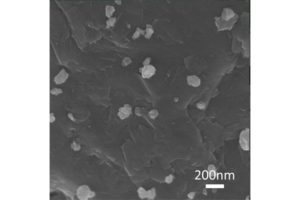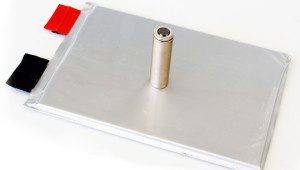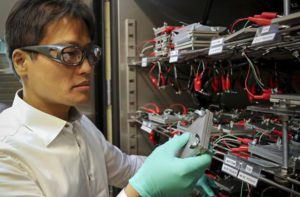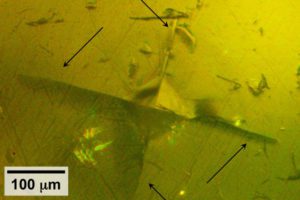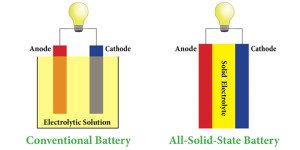The Battery500 consortium, led by the DOE’s Pacific Northwest National Laboratory (PNNL), intends to build a battery pack with a specific energy of 500 Wh/kg, which would more than double the 170-200 Wh/kg per kilogram in today’s typical EV battery. Part of the initiative is the “Seedling” program, which identifies new and risky battery research… Read more »
Search Results Found For: "solid electrolyte battery"
Saft team develops first metal hydride-sulfur battery
Researchers at French battery-maker Saft and Université Paris Est have, for the first time, used a nanocomposite metal hydride as the anode in a complete solid-state battery with a sulfur cathode and LiBH4 electrolyte. In “An all-solid-state metal hydride-Sulfur lithium-ion battery,” published in the Journal of Power Sources, Pedro López-Aranguren and colleagues explain that their… Read more »
Forge Nano to commercialize NREL-developed solid electrolyte coatings
The DOE’s National Renewable Energy Laboratory (NREL) has entered into an exclusive license agreement with Forge Nano to commercialize NREL’s patented battery materials and systems. A feature of the technology is the encapsulation of materials with solid electrolyte coatings that can be designed to meet the needs of any battery application. These batteries feature a… Read more »
Battery prelithiation shortens costly formation time
Before a lithium-ion battery is installed in a vehicle, it must undergo a lengthy process called formation, in which it is charged and discharged to control the initial chemical reactions with lithium. Many of these reactions are irreversible and permanently decrease the battery’s available energy. The process requires expensive lithium to be part of the… Read more »
FDK and Fujitsu develop novel cathode material for solid-state batteries
FDK and Fujitsu Laboratories have jointly developed lithium cobalt pyrophosphate (Li2CoP2O7) as a cathode material for solid-state lithium-ion batteries. The new material can operate at charge/discharge voltages of more than 5 V, which is beyond the limits of current lithium batteries. The energy of a battery is a function of its voltage and capacity, so an… Read more »
New protocol reduces Li-ion battery formation time by a factor of six
A new process developed by the Oak Ridge National Laboratory could alleviate a bottleneck in battery manufacturing and deliver higher capacity batteries. It also conserves lithium, which improves battery capacity. In “Fast formation cycling for lithium ion batteries,” published in the Journal of Power Sources, Seong Jin An and colleagues explain that the formation process,… Read more »
New episode of Nova looks at the state of battery tech
As growing EV sales make the headlines, the general public is becoming more aware of the batteries they carry around in their pockets and laptop cases. A recent episode of PBS’s Nova, “Search for the Super Battery,” offers a digestible summary of some of the advances happening in the battery field. In an attempt to… Read more »
MIT researchers investigate mechanics of sulfide-based solid electrolyte material
IMAGE: Using specialized equipment, a team from MIT did tests in which they used a pyramidal-tipped probe to indent the surface of a piece of the sulfide-based material. Surrounding the resulting indentation (seen at center), cracks were seen forming in the material (indicated by arrows), revealing details of its mechanical properties. Battery scientists are the world are exploring… Read more »
Funding available for Battery500 Seedling Projects
The DOE is issuing a funding opportunity (DE-FOA-0001629) for the Vehicle Technologies Office (VTO) of up to $19.7 million to support research and development of advanced vehicle technologies. The funding opportunity seeks projects in four areas, including Battery500 Seedling Projects. The VTO Battery500 Consortium has set a goal of doubling the specific energy of lithium… Read more »
UT Austin team developing solid-state sodium or lithium battery cell
Researchers at the University of Texas at Austin have devised a new strategy for an all-solid-state sodium or lithium EV battery cell. In “Alternative Strategy for a Safe Rechargeable Battery,” published in Energy & Environmental Science, noted lithium-ion battery pioneer Professor John Goodenough and his colleagues explain that the cells use a solid glass electrolyte…. Read more »




